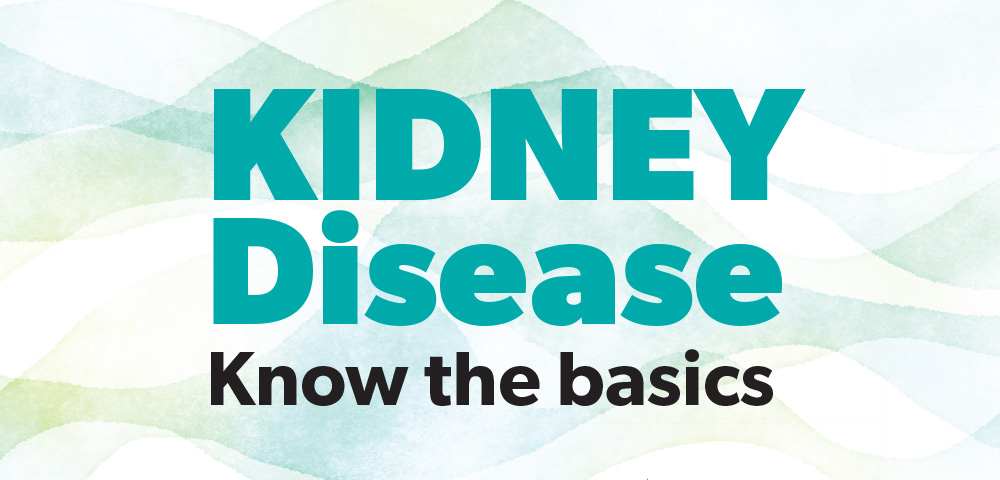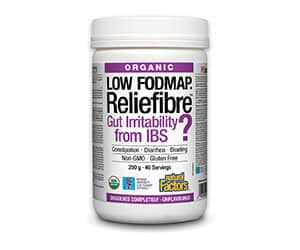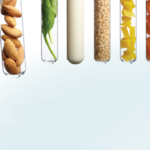
WE DON’T TALK ENOUGH ABOUT KIDNEY HEALTH, BUT WE SHOULD. WITH 1 IN 10 CANADIANS (1 IN 7 IN THE US) SUFFERING FROM KIDNEY DISEASE AND MORE AT RISK, IT’S NEVER TOO EARLY TO LEARN ABOUT KIDNEY CARE.
About the size of two fists, these two bean-shaped organs filter about one-half cup of blood every minute! The kidneys remove waste products and extra fluid from the body through urine, and help maintain a healthy balance of water, salts, and minerals. But it doesn’t end there! These critical organs make hormones that control blood pressure, support strong bones, and make red blood cells, while also regulating the body’s acid-base balance.
Family history of kidney disease, diabetes, high body mass index (BMI), dysbiosis, and certain autoimmune conditions, as well as exposure to specific medications, heavy metals, and drugs are risk factors for kidney disorders. Concerns related to kidney health often go unnoticed, especially in the early stages when people typically have no symptoms. However, it’s important to pay attention to the following warning signs and speak to your health care practitioner for further assessment:
- High blood pressure
- Blood and/or protein in the urine
- Frequent, difficult, or painful urination
- Puffiness around the eyes, and swelling of the hands and feet
Fatigue, reduced appetite, weight loss, skin colour changes, itching, anemia, and lower quality of life may also indicate kidney concerns. There are many ways we can support our kidney health, starting today.
Nutrition for Kidney Health
A healthy diet can support the kidneys and prevent kidney disease progression. The typical western diet, often high in unhealthy fats, refined sugars and grains, and poor-quality proteins, has been shown to increase body weight and inflammation, and negatively impact cardiovascular and kidney health. Conversely, the Mediterranean diet, including a high intake of fruits, vegetables, whole grains, legumes, fish, and fibre, along with reduced consumption of red meat, sodium, and refined sugars, provides beneficial effects on blood pressure, glucose, and lipid levels, thereby supporting kidney health.
One meta-analysis showed these healthy dietary patterns were associated with lower mortality rates in individuals with chronic kidney disease. Furthermore, plant-based diets have led to reduced body weight, improved cardiovascular effects, improved gut microbiota, and reduced kidney injury. Some individuals may also benefit from avoiding high-fructose foods and moderating protein consumption.
Nutritional Supplements for Kidney Health
Although there are nutritional supplements that can support kidney function, others may aggravate kidney conditions. You may be familiar with the benefits of calcium for bones and teeth; however, too much calcium can increase the risk of kidney stones, as can high doses of vitamin C. Individuals with chronic kidney disease may require certain nutrients such as iron, B vitamins, and vitamin D. Current research is investigating the benefits of key nutrients such as vitamin K2, probiotics, and omega-3 fatty acids for kidney health.
VITAMIN K2 deficiency is common in individuals with chronic kidney disease. Deficiency of this important nutrient can lead to calcium being deposited in blood vessels. Arterial calcification is highly prevalent in individuals with chronic kidney disease, increasing cardiovascular morbidity and mortality, especially in dialysis patients. Although some concerns have been raised regarding the use of fat-soluble vitamins A, D, E, and K in those with kidney disease, vitamin K2 is a powerful inhibitor of tissue calcification, and supplementation would be helpful in preventing deficiency and reducing the development of cardiovascular disease.
PROBIOTICS and PREBIOTICS may offer a solution to supporting the gut-kidney connection. Chronic kidney disease can cause microbial imbalance or dysbiosis, where there are higher quantities of pathogenic microbes and lower quantities of beneficial microbes. Such changes can lead to an increased concentration of urea and ammonia in the bowel, a compromised gut barrier wall, and increased levels of inflammation, which have been noted in patients with chronic kidney disease. Prebiotics and probiotics reduce toxic substances in the kidneys, restore the gut microbiota, and reduce inflammation.
OMEGA-3 FATTY ACIDS have been shown to reduce the risk of end-stage kidney disease and may lower the risk of protein in the urine. It is well known that omega-3s help manage high blood pressure, an important risk factor for the progression of kidney disease. Research has also shown that long-term daily intake of 400 mg of EPA and DHA may slow kidney function decline.
What Else Can You Do?
Performing regular physical activity, limiting alcohol intake, and quitting smoking are other important kidney health strategies. Before using any medications and supplements for the kidneys, always speak to your health care practitioner.
Don’t forget, it’s never too early to start keeping your kidneys healthy for life.
Kidney Health Assessment
(take the kidney health test)
Do you have impaired blood sugar levels or diabetes?
◯ Yes ◯ No
Do you have high blood pressure or take blood pressure medications?
◯ Yes ◯ No
Do you have a high BMI?
◯ Yes ◯ No
Do you have a family history of kidney disease?
◯ Yes ◯ No
Do you have abnormal urine and/or blood tests for kidney health?
◯ Yes ◯ NoIf you answered “no” to all of these questions, you do not have common risk factors for kidney disease. Keep your health as top priority by eating healthy, doing regular physical activity, supplementing with key nutrients, and not smoking.
If you answered “yes” to any of these questions, you have common risk factor(s) for kidney disease. Speak to your health care practitioner for further assessment and determine what you can do to keep your kidneys healthy starting today.
References
Kidney Foundation of Canada. Facing the Facts [Internet]. Kidney.ca; [updated 2020 Mar 25; cited 2021 July]. Available from: https://kidney.ca/KFOC/media/images/PDFs/Facing-the-Facts-2020.pdf
National Institute of Diabetes and Digestive and Kidney Diseases. Your Kidneys and How They Work [Internet]. 2018. [updated 2018 June; cited 2021 July]. Available from: https://www.niddk.nih.gov/health-information/kidney-disease/kidneys-how-they-work
National Kidney Foundation. How Your Kidneys Work [Internet]. Kidney.ca; 2018. [updated 2018 June, cited 2021 July]. Available from: https://www.kidney.org/kidneydisease/howkidneyswrk
Centers for Disease Control and Prevention. Chronic Kidney Disease Basics [Internet]. CDC.gov; 2020. [updated 2020 Feb; cited 2021 July]. Available from: https://www.cdc.gov/kidneydisease/basics.html
Jia L, Jia Q, Yang J, et al. Efficacy of probiotics supplementation on chronic kidney disease: a systematic review and meta-analysis. Kidney Blood Press Res. 2018; 43(5):1623-35.
Kim NH, Hyun YY, Lee K-B, et al. Environmental heavy metal exposure and chronic kidney disease in the general population. J Korean Med Sci. 2015; 30(3):272-7.
Rysz J, Franczyk B, Ciałkowska-Rysz A, et al. The effect of diet on the survival of patients with chronic kidney disease. Nutrients. 2017; 9(5):495.
Kramer H. Diet and chronic kidney disease. Adv Nutr. 2019; 10(Suppl_4):S367-79.
Chauveau P, Aparicio M, Bellizzi V, et al. Mediterranean diet as the diet of choice for patients with chronic kidney disease. Nephrol Dial Transplant. 2018; 33(5):725-35.
Kelly JT, Palmer SC, Wai SN, et al. Healthy dietary patterns and risk of mortality and ESRD in CKD: a meta-analysis of cohort studies. Clin J Am Soc Nephrol. 2017; 12(2):272-9.
Chauveau P, Koppe L, Combe C, et al. Vegetarian diets and chronic kidney disease. Nephrol Dial Transplant. 2019; 34(2):199-207.
Johnson RJ, Perez-Pozo SE, Lillo JL, et al. Fructose increases risk for kidney stones: potential role in metabolic syndrome and heat stress. BMC Nephrol. 2018; 19(1):315.
Ko G-J, Rhee CM, Kalantar-Zadeh K, et al. The effects of high-protein diets on kidney health and longevity. J Am Soc Nephrol. 2020; 31(8):1667-79.
Cozzolino M, Mangano M, Galassi A, et al. Vitamin K in chronic kidney disease. Nutrients. 2019; 11(1):168.
Roumeliotis S, Dounousi E, Salmas M, et al. Vascular calcification in chronic kidney disease: the role of vitamin K- dependent matrix gla protein. Front Med (Lausanne). 2020; 7:154.
Stavropoulou E, Kantartzi K, Tsigalou C, et al. Focus on the gut-kidney axis in health and disease. Front Med (Lausanne). 2021; 7:620102.
Ranganathan N. Reality of “Enteric Dialysis®” with probiotics and prebiotics to delay the need of conventional dialysis. J Nephrol Ther. 2018; 8:5.
Fagundes RAB, Soder TF, Grokoski KC, et al. Probiotics in the treatment of chronic kidney disease: a systematic review. J Bras Nefrol. 2018; 40(3):278-86.
Hu J, Liu Z, Zhang H. Omega-3 fatty acid supplementation as an adjunctive therapy in the treatment of chronic kidney disease: a meta-analysis. Clinics (Sao Paulo). 2017; 72(1):58-64.
Hoogeveen EK, Geleijnse JM, Kromhout D, et al. Effect of omega-3 fatty acids on kidney function after myocardial infarction: the Alpha Omega Trial. Clin J Am Soc Nephrol. 2014; 9(10):1676-83.
Ricardo AC, Madero M, Yang W, et al. Adherence to a healthy lifestyle and all-cause mortality in CKD. Clin J Am Soc Nephrol. 2013; 8(4):602-9.














